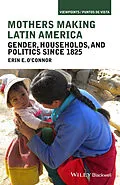Mothers Making Latin America utilizes a combination of gender scholarship and source material to dispel the belief that women were separated from--or unimportant to--central developments in Latin American history since independence.
* Presents nuanced issues in gender historiography for Latin America in a readable narrative for undergraduate students
* Offers brief, primary-source document excerpts at the end of each chapter that instructors can use to stimulate class discussion
* Adheres to a focus on motherhood, which allows for a coherent narrative that touches upon important themes without falling into a "list of facts" textbook style
Autorentext
Erin E. O'Connor is Associate Professor of History at Bridgewater State University in Massachusetts. Her publications include Gender, Indian, Nation: the Contradictions of Making Ecuador, 1830-1925 (2007), Documenting Latin America: Gender, Race, and Empire, Volume 1 (with L. Garofalo, 2011)and Documenting Latin America: Gender, Race, and Nation, Volume 2 (with L. Garofalo, 2011).
Klappentext
The cult of motherhood has a lengthy and complex history in Latin American society. Mothers Making Latin America utilizes a combination of innovative gender scholarship and primary source material to dispel the commonly held belief that women were separated fromor unimportant tocentral developments in Latin American history since independence. With scholarly precision, author Erin E. O'Connor also discards the popular notion that the only women worthy of study were those who rejected gender norms in their entirety. Instead, O'Connor explores how ideas about motherhood, and women's own interpretations of that role, were often central to processes of socio-political change in Latin America. Featuring a thought-provoking blend of original scholarship with an accessible narrative thread, Mothers Making Latin America helps to reshape our understanding of Latin American gender history.
Zusammenfassung
Mothers Making Latin America utilizes a combination of gender scholarship and source material to dispel the belief that women were separated fromor unimportant tocentral developments in Latin American history since independence.
- Presents nuanced issues in gender historiography for Latin America in a readable narrative for undergraduate students
- Offers brief, primary-source document excerpts at the end of each chapter that instructors can use to stimulate class discussion
- Adheres to a focus on motherhood, which allows for a coherent narrative that touches upon important themes without falling into a list of facts textbook style
Inhalt
Series Editor's Preface vi
Acknowledgments viii
Source Acknowledgments xi
1 Introduction: Gender and Latin American History, or: Why Motherhood? 1
2 Motherhood in Transition: From Colonies to Independent Nations 24
3 Poor Women: Mothering the Majority in the Nineteenth Century 51
4 Middle-Class and Elite Mothers: Feminism, Femininity, and the Nation in the Nineteenth Century 80
5 Motherhood at the Crossroads of Tradition and Modernity, circa 19001950 102
6 Poor Mothers and the Contradictions of Modernity, circa 19001950 133
7 Mothers and Revolution, circa 19101990: Mexico, Cuba, and Nicaragua 158
8 Maternalizing Politics, Politicizing Motherhood: Women and Politics, circa 19501990s 193
9 Bodies, Policies, and Globalization: Contraception and Abortion in Latin America 222
10 Motherhood Transformed? History, Gender, and the Shift into the Twenty-First Century 248
Bibliography 267
Subject Index 283
